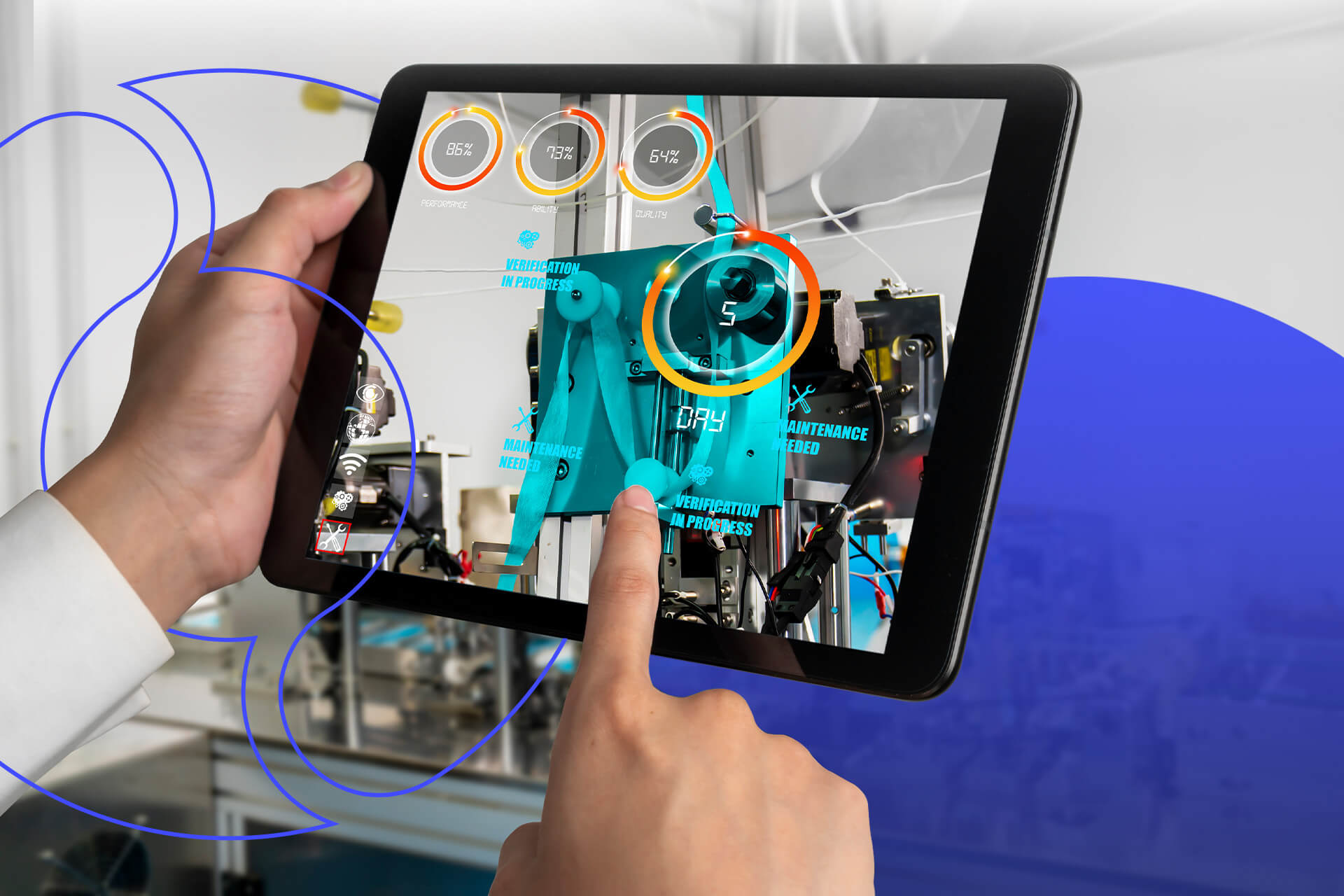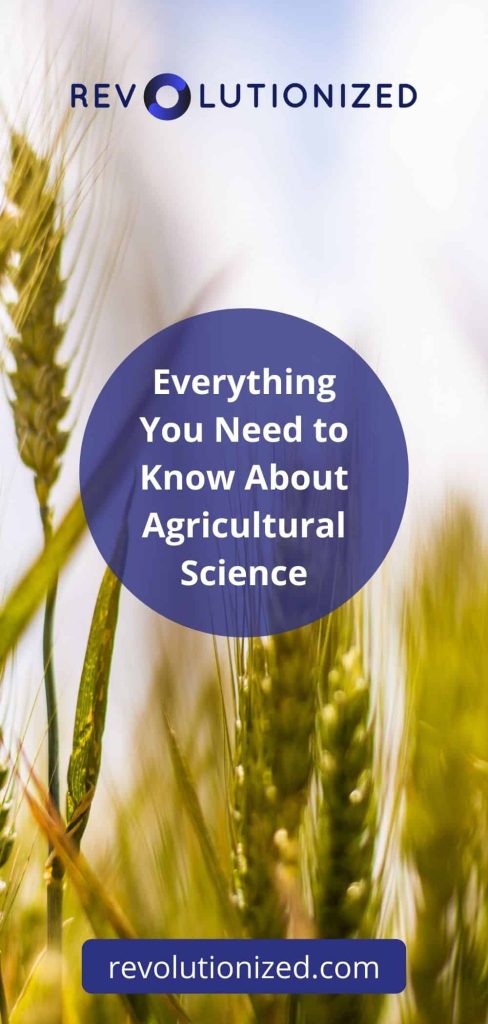



Revolutionized is reader-supported. When you buy through links on our site, we may earn an affiliate commision. Learn more here.
Every time you head to the store and buy groceries, or grab an apple fresh from the tree, you’re enjoying the fruits of the agriculture industry. Cultivating soil for farming and raising livestock all fall under the agriculture bubble. However, there is another aspect of this sector that many people overlook — and it is agricultural science. What does this sector do and how does it differ from agriculture?
Today, we’ll take a closer look at the different types of agricultural science and the various degrees and careers you can pursue within this field.
We define agriculture science as the sciences that encompass everything from food and fiber production to soil and crop cultivation and animal processing.
This definition sounds similar to that of agriculture, with one major difference. Agriculture is the practice and act of planting crops and racing livestock. Agricultural science, on the other hand, allows researchers to study the science behind it. In that way, it’s an even broader term than agriculture.
There are so many branches of agriculture science that we’d be hard-pressed to define them all. Still, let’s take a closer look at those we’re most familiar with.
Scientists define biotechnology as the “exploitation of biological processes for industrial and other purposes.” Agricultural bio technicians use tools such as genetic engineering and molecular markers to modify living organisms — plants, animals and microorganisms — for use in agriculture.
Pathology is the study of disease. In agricultural pathology, scientists study diseases that affect both livestock and food crops and find ways to treat and prevent them. An unchecked disease can wipe out an entire crop or herd of animals, so pathology is an essential branch of agricultural science.
Horticulture is the science of gardening. It includes floriculture — growing flowers — floristry, nursery production and landscape horticulture under its umbrella. You’ll find horticulturists everywhere, from your local flower shop to tending elaborate public gardens and designing mind-blowing landscaping at your favorite theme park, just to name a few.
Soil scientists study the soil under our feet as a natural resource. These researchers handle everything from mapping and classification to the chemical properties of soil and how to ensure fertility for crop growth. This branch of agriculture is necessary for everything from food production to environmental preservation. We have to understand the soil to both use it and preserve it for future generations.
Agricultural scientists are always looking for new ways to improve production techniques and will have specialists focused on things like fertilizers and irrigation management.
Agricultural production technicians help us improve crop yield, which helps keep the planet fed while reducing our impact on the environment. Production technicians may focus on lowering water usage or planting crops that are naturally disease-, pest- or drought-resistant.

Researchers focusing on agricultural productivity look at two things — quantity and quality. They may work in the lab, developing drought-resistant crops, or they could work in a virtual environment, running simulations on crop growth. Agricultural productivity is a broad umbrella that covers a variety of specialties.
No one likes pests in their garden, and, in a commercial field, an infestation can be devastating. Researchers are always looking for new and safer ways to minimize the effect of pests on crops and livestock to improve health and production. This can include everything from creating new and safer pesticides to working with scientists to create disease- and pest-resistant crops and livestock.
Once the crops are grown, and the livestock is ready for harvesting, agricultural scientists are responsible for the techniques that turn these foods into the ready-to-eat products you’re used to finding at the grocery store.
These specialists focus on everything from keeping food safe while it’s making the trip to your local grocery store, to finding ways to reduce the company’s reliance on single-use plastics to improve sustainability.
Modern industrial farming can be harmful to the environment, so agricultural ecologists are constantly looking for ways to prevent and correct any negative environmental impacts. They can come up with new ways to raise crops and livestock, or look back in time and study the indigenous practice of subsistence farming.
This technique used crop rotation and other tools to get the most out of the land without stripping it of all its natural nutrients.
Not everything in agriculture happens in the field. Theoretical scientists can create digital models to simulate how a crop will perform under a variety of different circumstances.
This is incredibly valuable in modern agriculture, especially for small businesses. These farms might not be able to afford the loss that occurs if something goes wrong with an experimental new crop or technique. Theoretical production ecologists can project what might happen before they ever plant their first seed.
Researchers are both learning from and helping to improve subsistence farming techniques around the world. This field focuses on reducing things like food and agricultural waste while enabling farmers to grow enough food to feed everyone.
Subsistence farming practices date back to the beginning of human agriculture, and we’ve forgotten much of this wisdom as we’ve made the switch to modern and industrialized farming practices.
Agricultural science isn’t limited to just the United States. Scientists study food production on a global level, though they might pay closer attention to the countries that produce and export the most.
This field includes everything from the amount of food we’re growing to the food imported and exported by every country in the world. That way, we can keep track of food production and figure out where there may be shortages or issues.
Agroclimatologists and agrometeorologists study the weather and how it could potentially affect crops and livestock in any given area.
Anything from hot and dry summers to an extra-rainy fall season can affect how well crops grow. Climate change is having a dramatic impact on agriculture around the globe, and it’s up to agroclimatologists and agrometerologists to predict how these weather changes will affect global crop growth.
This field is very broad, but in general, biology is going to be one of the most important branches of agricultural science. Biology encompasses everything from the bioengineers creating new species of food crops to the veterinarians keeping livestock healthy around the globe and everything in between. Biology provides the foundation of agriculture.
These researchers create the devices that make agriculture easier than ever, from soil testing kits to drones that monitor fields and everything in between.
Technology is changing the agricultural field by opening up new avenues and making it easier than ever to get the best yield in spite of ever-changing climate conditions. If you see farmers using networked moisture sensors to decide when to irrigate, or photographing their field from the air using drones, thank an agricultural engineer.
Of course, there is also the economic side of the agricultural industry, and that sector requires a skilled specialist who understands both the science of agriculture and economics and how they mesh together. Agricultural economics plays an enormous role in the overall stability and livelihood of a country.
This list is just a small sampling of the branches of agricultural science that you could potentially study while still working in the same field.
There are so many possible careers in this industry that it’s hard to know where to start. According to the USDA, these career opportunities break down into four categories:
Colleges of agricultural science offer a variety of programs depending on your interests. If working with farmers and improving the environment appeals to you, consider a career as an arboriculturist — someone who grows and studies trees, a landscape designer or a farmer. If the managerial side of the industry is more appealing, study agricultural business or economics and work your way up as an economist or sales expert.
There are, quite literally, hundreds of jobs that fall under the umbrella of agricultural science. If this sounds like a field you’d be interested in, you’ll be able to find something that you’ll love doing.
Agricultural science is a broad term, and we’ve only scratched the surface of the potential degrees and careers that might branch out of this type of science. These programs may be more common in rural parts of the country, but you can find applicable degree programs nearly anywhere in the world.
Revolutionized is reader-supported. When you buy through links on our site, we may earn an affiliate commision. Learn more here.


This site uses Akismet to reduce spam. Learn how your comment data is processed.